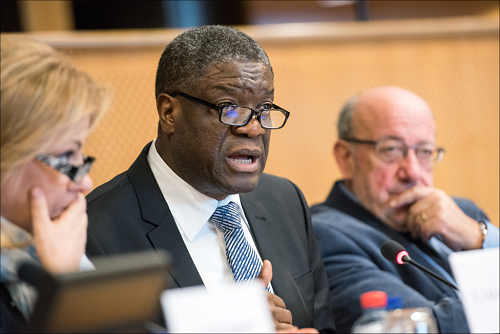Democracy and values are problematic in DRC, says Denis Mukwege
Dr Denis Mukwege, the 2014 Sakharov Prize laureate, described political problems in the Democratic Republic of the Congo and his difficulties in tackling the problem of sexual abuse of women and even small children, in a Human Rights Subcommittee debate on Thursday. MEPs discussed how the EU could best support Dr Mukwege’s work, and some called for legally-binding rules on trade in conflict minerals.

Subcommittee on Human Rights (DROI) of the European Parliament discussion with Denis Mukwege, Sakharov Prize Laureate 2014
"There are attempts to intimidate us, to destroy our reputation in the press", said Dr Mukwege. The "authorities are in denial – I have never been invited to Parliament in DRC", he observed, adding that "no development is possible without changing mentalities and a population which has lost its values" and that the "pre-election climate reduces civil liberties and the opposition’s rights".
Subcommittee Chair Elena Valenciano (S&D, ES) voiced Parliament's continuing support for Dr Mukwege's work, stressing that "we need to ensure the safety and security of the Panzi Hospital", which he founded.
Denis Mukwege also stressed that Sakharov Prize had "changed his life", by inspiring much positive action and mobilising citizens, and backed a call by many MEPs for legally binding rules on trade in "conflict minerals".
Source: European Parliament
- 324 reads
Human Rights
Fostering a More Humane World: The 28th Eurasian Economic Summi

Conscience, Hope, and Action: Keys to Global Peace and Sustainability

Ringing FOWPAL’s Peace Bell for the World:Nobel Peace Prize Laureates’ Visions and Actions

Protecting the World’s Cultural Diversity for a Sustainable Future

Puppet Show I International Friendship Day 2020

